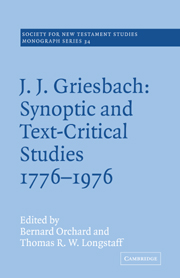Book contents
- Frontmatter
- Contents
- Portrait of J. J. Griesbach
- Copy of Colloquium announcement
- List of participants and selected observers
- Preface
- Abbreviations
- 1 The genesis of the Colloquium
- 2 Johann Jakob Griesbach: his life, work and times
- 3 The Gospel synopsis from 1776 to the present day
- 4 Griesbach's answer to the Synoptic Question
- 5 Commentatio qua Marci Evangelium totum e Matthaei et Lucae commentariis decerptum esse monstratur
- 6 A demonstration that Mark was written after Matthew and Luke
- 7 Griesbach and the development of text criticism
- 8 Modern text criticism and the Synoptic Problem
- 9 At the Colloquium's conclusion
- 10 The Griesbach Hypothesis: a bibliography
- Notes
- Appendix
- Index
8 - Modern text criticism and the Synoptic Problem
Published online by Cambridge University Press: 23 December 2009
- Frontmatter
- Contents
- Portrait of J. J. Griesbach
- Copy of Colloquium announcement
- List of participants and selected observers
- Preface
- Abbreviations
- 1 The genesis of the Colloquium
- 2 Johann Jakob Griesbach: his life, work and times
- 3 The Gospel synopsis from 1776 to the present day
- 4 Griesbach's answer to the Synoptic Question
- 5 Commentatio qua Marci Evangelium totum e Matthaei et Lucae commentariis decerptum esse monstratur
- 6 A demonstration that Mark was written after Matthew and Luke
- 7 Griesbach and the development of text criticism
- 8 Modern text criticism and the Synoptic Problem
- 9 At the Colloquium's conclusion
- 10 The Griesbach Hypothesis: a bibliography
- Notes
- Appendix
- Index
Summary
That there is an interrelationship between textual criticism and the Synoptic Problem is the presupposition of most Synoptic studies. Nonetheless the specific nature of that relationship, especially as it affects the finding of solutions, is seldom spelled out, and, it would seem, is frequently neglected. This present paper is an attempt, partially at least, to fill up that lacuna.
As far as I know, the last comprehensive study which took both disciplines (textual and Synoptic criticism) seriously as being interrelated in arriving at solutions was B. H. Streeter's monumental The Four Gospels (1924). The first two large sections of his book were entitled ‘The Manuscript Tradition’ and ‘The Synoptic Problem’. I may be pardoned for borrowing this Gattung for my paper. In part I, some suggestions are offered as to what ‘modern textual criticism’ means, by overviewing some recent work on method. Since I am part of the debate in this area, I can scarcely be expected to achieve objectivity! But I do hope I have been fair to all, and have touched on the essential issues. In part II, I offer some general observations on the chief area of interrelationship, the problem of harmonization/dis-harmonization. The illustrations in this section are basically concerned with the resolution of textual questions.
Modern Textual Criticism
The term ‘modern textual criticism’ can mean precisely what its user intends it to mean.
- Type
- Chapter
- Information
- J. J. Griesbach: Synoptic and Text - Critical Studies 1776–1976 , pp. 154 - 169Publisher: Cambridge University PressPrint publication year: 1979



